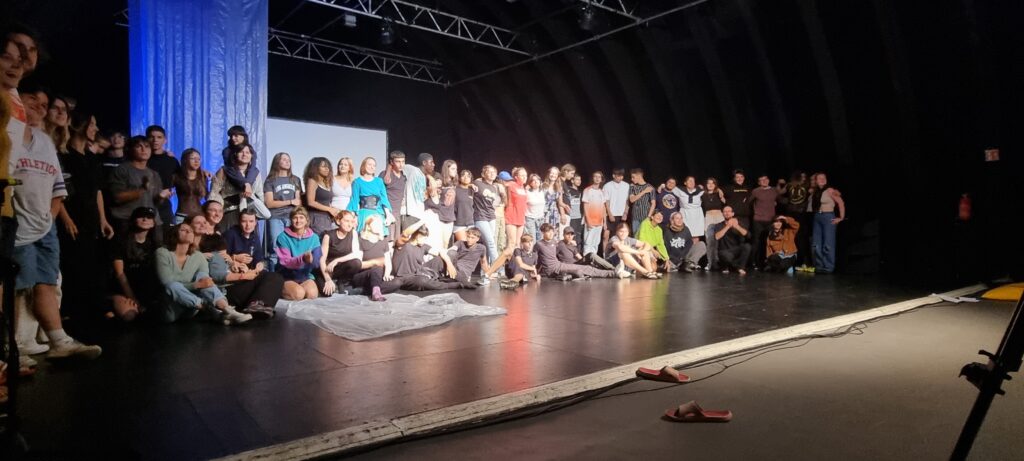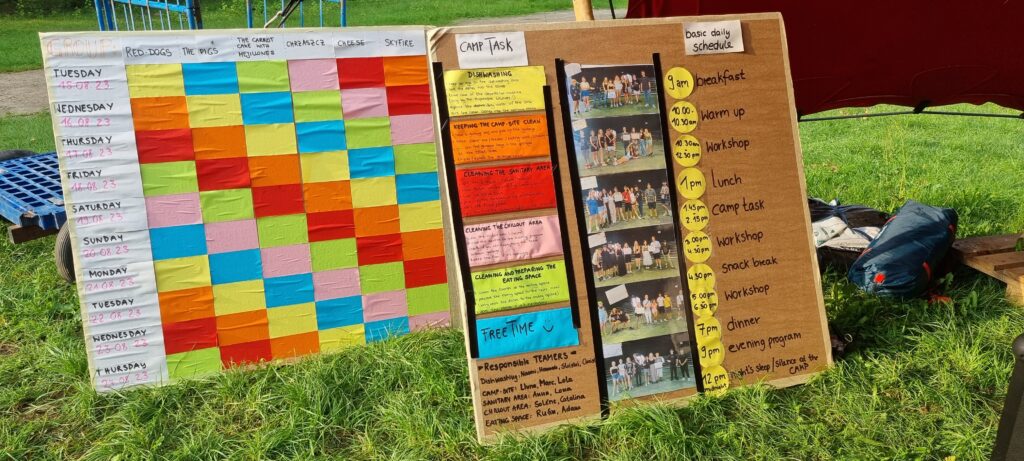
Italian Group
The Italian group started working on the concept of „solidarity“ by defining what that means for us. We came up with a broad definition: „Solidarity is being willing to do something for someone else, without expecting anything in return.“ We then started discussing examples of solidarity (or lack thereof) in our personal lives, and we quickly ended up talking about an instance that is very near and dear to our hearts. In May, the region we live in suffered catastrophic floods that led to the destruction of many people’s lives and homes. Amidst the pain and trauma that everyone in the affected areas suffered, solidarity shone through: people, especially youths, from all over the region and the country came running to help fix the damage, saving what little could be retrieved from the thick mud covering everything, and trying to support and lift each other up.
The discussion was an important one to be had, as it allowed the youths to talk through and reflect on a shared traumatic experience, on its impact and its connections to other important topics, such as global warming, and to express important lessons they learned during the crisis, especially on the importance of showing up for those in need and on the power that we each hold, on the value of community and mutual support. The youths were then able to channel their story and their message into the presentation.

Spanish Group
The Spanish group wanted to center their workshops on examples of solidarity within the European Union. Far from just presenting any act of solidarity as useful and magnificent, we wanted to question the established protocols and examine the reality of marginalized communities within the EU. We centered the activities more on the Spanish situation, which led to two activities that had a really good welcome and results among the group of youths.
We gave each participant a paper with a „role“ they had to perform. These roles were totally different from their own personal reality, aiming to make them understand life through other people’s lives and how we can act upon our own actions and even international legislations to create a more fair and easy world for everyone.
These activities made the youths really question their own realities and understand other people’s lives, leading to really interesting debates among them. Different points of view were shown from the different participants, which was interesting due to the fact that they could try to explain how each of them perceived society and their own rights, considering they come from different backgrounds and experiences.
At the end of the seminars, we were all really happy to talk with each other and learn at least a little bit from each of us, which, in some way, is also an act of solidarity.
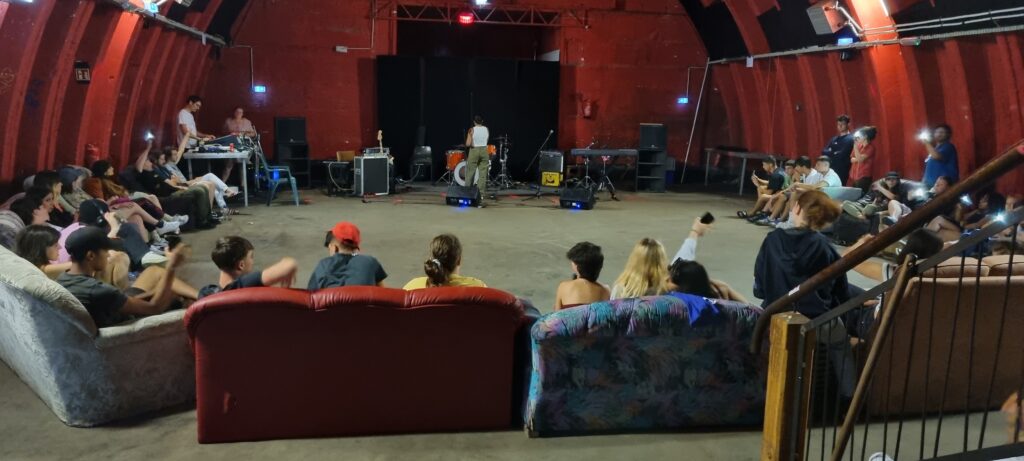
Italian Group
The Italian group started working on the concept of „solidarity“ by defining what that means for us. We came up with a broad definition: „Solidarity is being willing to do something for someone else, without expecting anything in return.“ We then started discussing examples of solidarity (or lack thereof) in our personal lives, and we quickly ended up talking about an instance that is very near and dear to our hearts. In May, the region we live in suffered catastrophic floods that led to the destruction of many people’s lives and homes. Amidst the pain and trauma that everyone in the affected areas suffered, solidarity shone through: people, especially youths, from all over the region and the country came running to help fix the damage, saving what little could be retrieved from the thick mud covering everything, and trying to support and lift each other up.
The discussion was an important one to be had, as it allowed the youths to talk through and reflect on a shared traumatic experience, on its impact and its connections to other important topics, such as global warming, and to express important lessons they learned during the crisis, especially on the importance of showing up for those in need and on the power that we each hold, on the value of community and mutual support. The youths were then able to channel their story and their message into the presentation.
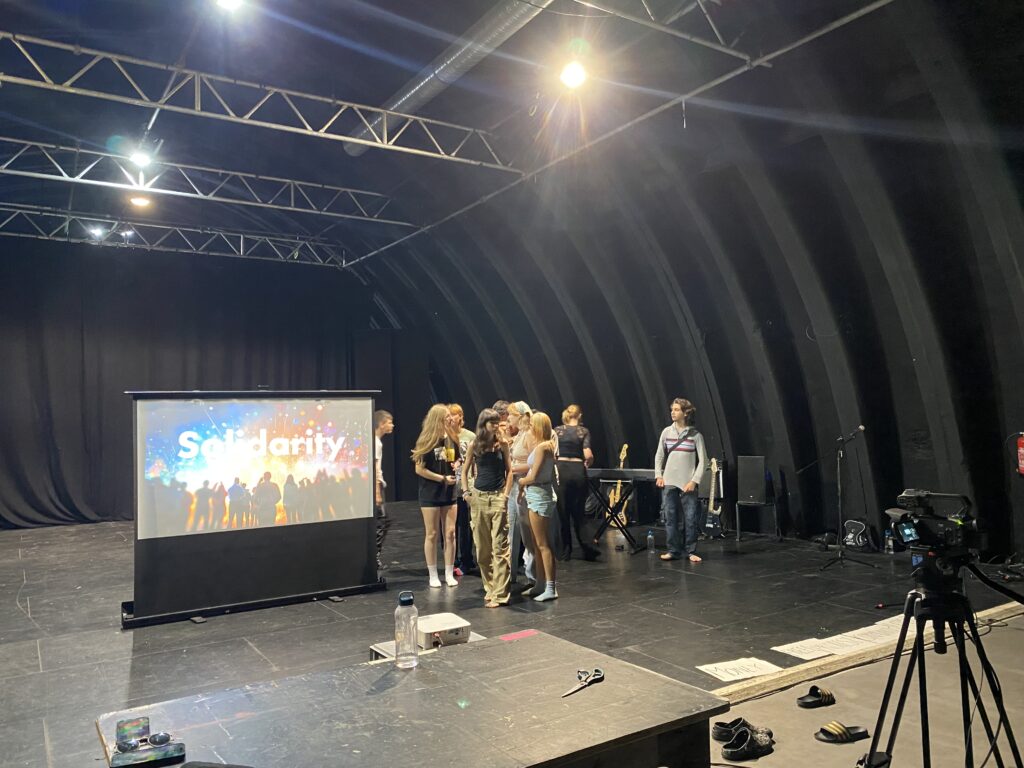
Polish Group
Some statements for youths of the polish group:
„For me, the art camp was one of the best things I’ve experienced in my life. Being there made me more conscious of solidarity and relations between humans. We learned a lot about tolerance and acceptance. I met dozens of kind, friendly, and cheerful people from other countries who accepted me for who I am. I really enjoyed doing art and the freedom we had in expressing our thoughts. I’m also thankful for the great opportunity to practice my language skills.“
„The art camp taught us many important values, such as solidarity, which was the main topic of our workshops. We were divided into groups, and in these groups, we worked on presenting solidarity. We could do it however we wanted, which expanded our creativity and ability to work together and help each other. But most importantly, during the workshops, we got to express and educate ourselves, for which I am very thankful.“
„At the art camp, there were four main groups: music, theater, digital, and art. My friends and I had the opportunity to try the art side. Our topic was generally about solidarity, and it was up to us how we wanted to express it. We chose the solidarity that riots about women’s rights create and made all sorts of things, such as banners, scenes, and some meaningful art pieces. Overall, I think the art camp was one of the best lessons about solidarity, but not only that. I think we learned more about responsibilities, the sheer value of women, and the real impact they present.“
„We divided into groups, and each group chose different topics (such as women’s hell). Then we presented our ideas to the rest and voted on which topic should be presented. The previously mentioned women’s hell won. I think that this topic touched everyone very much, and the women who saw our presentation are even more aware of their value. After the visible involvement of Polish women in this matter, they will fight for their rights.“
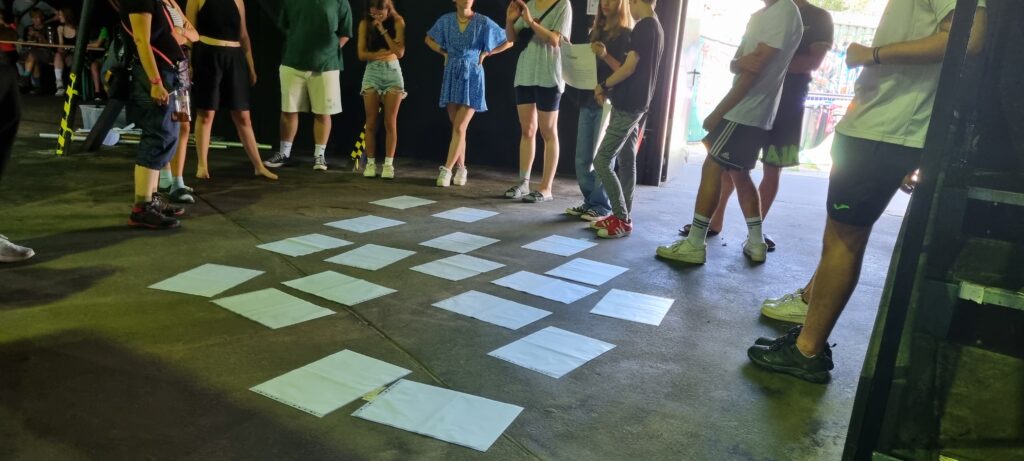
German Group
Within the group based in Germany, we initially engaged with headlines in the thematic workshops. These were news articles that focused on various forms of solidarity. We exchanged thoughts on the motives and goals of solidarity and discussed how different forms of solidarity are perceived. Subsequently, we delved into various quotes describing solidarity, sparking fruitful discussions on what constitutes solidarity and what does not. One quote that we presented during the workshop results presentation was the following.
“If you have come here to help me, you are wasting your time, but if you have come because your liberation is bound up with mine, then let us work together.” (Lilla Watson)
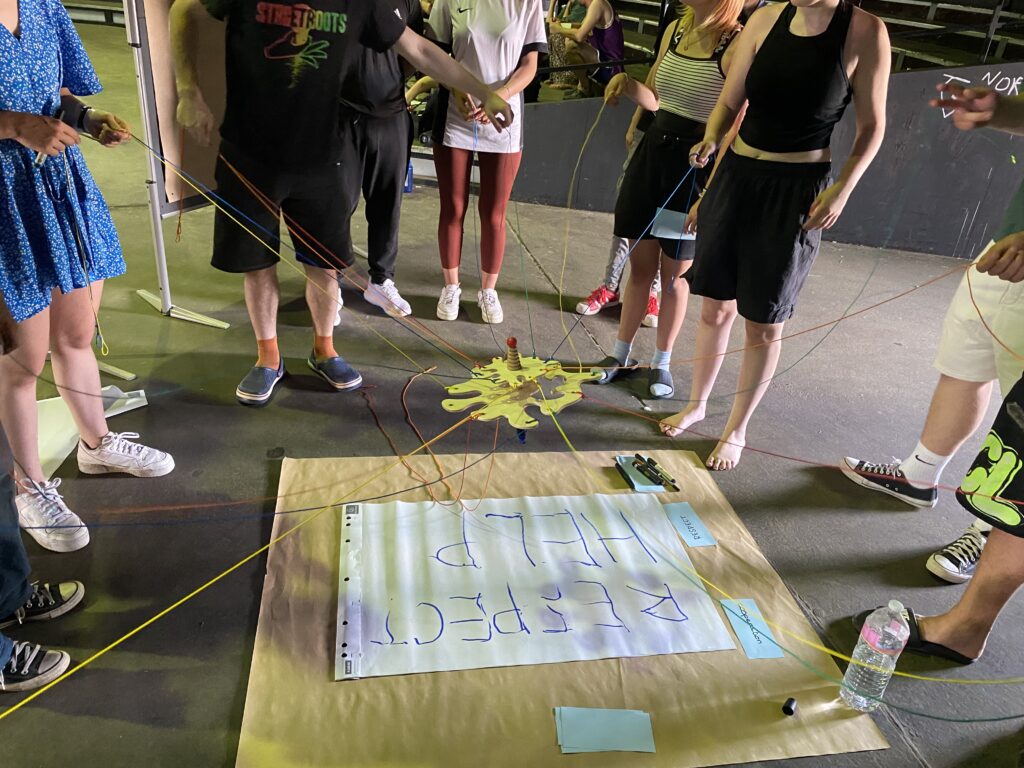
The quote received a lot of approval within the group. Afterward, we explored forms of solidarity from the group’s everyday life. Examples were collected within the group, and one of them was presented in the presentation. A significant role was played by acts of solidarity in bullying situations. To illustrate, a small theatrical piece was collaboratively developed and presented to groups from other countries.
The German group comprised youths from different parts of the country, forming a highly diverse group with individuals from various migration backgrounds and life situations.
